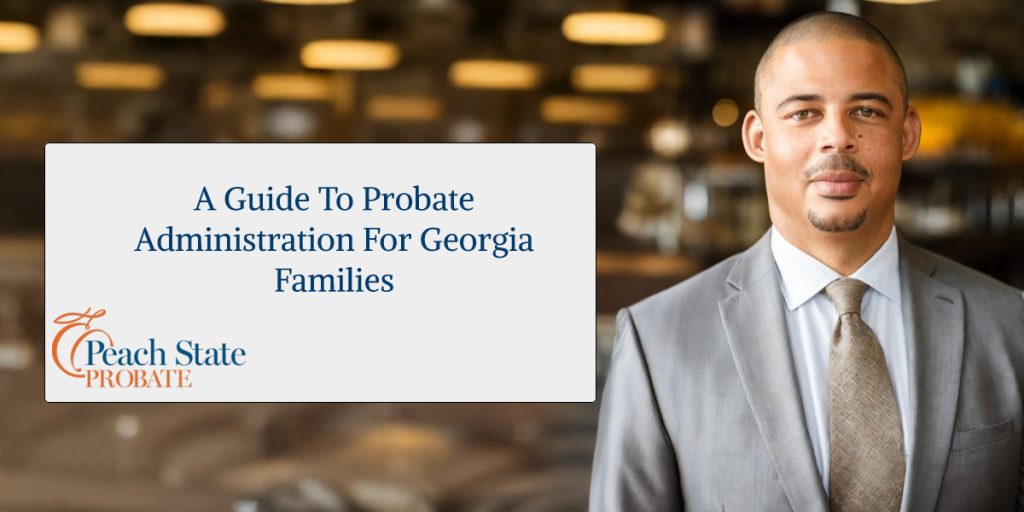## Understanding Probate Administration in Georgia: A Comprehensive Guide for Families
Navigating through the complexities of probate administration is essential for Georgia families facing the loss of a loved one. This process serves as the legal pathway through which a deceased person’s estate is managed and distributed. The probate administration process can appear daunting, especially given the emotional strain often associated with loss. Families need to be well-informed about what lies ahead, ensuring that the last wishes of their loved ones are honored.
Probate administration involves a series of legal steps that ensure the orderly distribution of an estate according to the decedent’s wishes as expressed in their will, or according to state laws in the absence of one. From confirming the legitimacy of a will to paying debts and distributing assets, the responsibilities can be substantial. To effectively manage these responsibilities, understanding the intricacies of this legal process is vital for families during a tough emotional period.
Understanding probate administration is not merely an academic pursuit; it impacts how assets will be handled and how disputes may arise among heirs. In Georgia, the administration can vary based on factors such as the size of the estate, the existence of a will, and the family dynamics involved. This makes it essential for families to familiarize themselves with the relevant terms and procedures.
## Defining Probate Administration
Probate administration is the legal process through which a deceased person’s estate is settled. It encompasses everything from validating the will to distributing assets to beneficiaries. In Georgia, this process is governed by a specific set of laws and procedures that can vary based on individual circumstances.
The process begins with the appointment of an executor, usually named in the will, or an administrator if there is no will. The executor’s responsibilities include settling debts, managing estate assets, and distributing the remaining property to rightful heirs. In cases without a will, Georgia’s intestacy laws dictate how assets are distributed among surviving relatives, which may lead to outcomes that are not reflective of the deceased’s wishes.
A critical component of probate administration involves court involvement, particularly in validating the will and overseeing the estate’s administration. This ensures that all transactions are conducted legally and that beneficiaries receive their rightful inheritance. The duration and complexity of this process can be influenced by several factors, including disputed wills, the types of assets involved, and the overall value of the estate.
## The Importance of Understanding Probate Administration
Understanding probate administration is crucial for families, as it directly impacts how estates are settled after a loved one’s death. By grasping the ins and outs of this legal process, families can better prepare for the responsibilities and challenges that may arise. Without a thorough understanding, families may face unnecessary complications, legal disputes, and delays in the distribution of assets.
The significance of recognizing the process extends beyond mere estate management; it also holds emotional implications for families. The administrative duties involved can be overwhelming during an already distressing time. Familiarity with probate administration can reduce anxiety, enabling families to focus on healing while ensuring that financial obligations and estate matters are handled appropriately.
Additionally, understanding probate administration helps families avoid common pitfalls. Missteps in the administration process can lead to disputes among heirs, delays in distribution, or even legal repercussions. For families in Georgia, being equipped with knowledge about probate administration is essential for protecting their loved ones’ legacies and ensuring a smooth transitional process.
## The Legal Framework Surrounding Probate Administration in Georgia
The legal landscape for probate administration in Georgia is rooted in state statutes that set forth the necessary procedures and requirements. The Georgia Probate Code governs the process, detailing how wills are validated, how estates are administered, and how disputes are resolved. Understanding this framework is essential for families to comprehend their rights and obligations during this process.
In Georgia, the probate process begins with filing a petition in the probate court, where jurisdiction is based on the decedent’s residency. The court will then ensure that all requirements are met, including validating the will if one exists. The probate court holds the authority to oversee and enforce the various responsibilities of the executor or administrator, fostering a structured framework aimed at protecting the deceased’s interests and the rightful heirs.
Another critical aspect of the legal framework includes the deadlines established for various actions. For example, Georgia law sets specific time limits for filing claims against the estate, distributing assets, and closing the estate. Adhering to these timelines is vital for preventing complications and ensuring compliance with state regulations. A clear understanding of these legal requirements allows families to proceed with confidence and clarity throughout the probate administration process.
## Real-World Scenarios Illustrating Probate Administration Challenges
Real-world examples can illuminate the practical application of probate administration in Georgia. Case studies of families navigating this process reveal the potential challenges and emotional complexities involved. For instance, an executor may encounter disputes between heirs who have conflicting interpretations of the deceased’s intentions, leading to delays and heightened tensions.
Consider a scenario where a decedent leaves behind a substantial estate with various assets, including real estate and investments, but has failed to clearly articulate their wishes in a will. In this case, the probate administration process becomes complicated, as family members may have differing opinions on how to manage and distribute those assets. Such situations illustrate the importance of having a well-defined estate plan to minimize confusion and conflict amid grieving family members.
Another example involves a surviving spouse who discovers significant debts owed by the decedent. This can overshadow the distribution of assets and complicate the probate administration, especially when debts exceed the value of the estate. Without proper legal guidance, the spouse may unknowingly assume liability for these debts, creating further emotional and financial strain. These real-life examples highlight that probate administration can be fraught with various challenges that, if not managed carefully, may lead to significant obstacles for families.
## Practical Steps for Managing Probate Administration
Families can take specific proactive steps to manage the probate administration process effectively. The first step involves gathering all essential documents, including the will, trust documents, and financial records. Having these documents organized will streamline the process and provide clarity on the deceased’s financial situation and wishes, which is crucial for fulfilling their last requests.
Next, families should familiarize themselves with Georgia’s probate laws, as these can differ significantly from those in other states. Understanding the local laws governing probate can prepare families for the specific requirements they will face. This includes knowledge about probate court filings, timelines, and creditor claims, all of which play a pivotal role in estate management.
Maintaining clear communication among family members throughout the process is equally important. Open discussions can address any misunderstandings and ensure that everyone involved understands the proceedings. This can help prevent disputes and keep the focus on honoring the memory of the deceased rather than getting entangled in legal battles.
## Common Missteps in Probate Administration: What to Avoid
Avoiding common pitfalls during probate administration is essential for families seeking to streamline the process. One frequent mistake is overlooking the importance of timely paperwork. Each phase of the probate process is governed by specific timelines, and failing to adhere to these deadlines can result in unnecessary delays or financial liabilities. Executors must prioritize timely filings and notifications to beneficiaries and creditors.
Another common error involves inadequate communication with heirs and beneficiaries. When family members are left in the dark about proceedings, resentment and mistrust can grow, often leading to disputes that complicate the administration process. Regular updates and transparent communication can foster unity and understanding among family members, steering clear of potential conflicts.
Additionally, neglecting to keep thorough records can pose significant challenges later on. Executors are responsible for documenting all transactions, including asset valuations, payments made, and distributions. A lack of proper documentation can lead to disputes over financial accountability and complicate future proceedings if questions arise about how the estate has been managed. Families should prioritize careful record-keeping throughout the probate administration process.
## When It’s Time to Consult a Legal Professional
Determining when to consult a legal professional during probate administration can greatly influence the outcome for families. Many families may initially feel confident managing the process independently. However, as the complexities of the estate unfold, it often becomes apparent that professional guidance is necessary. Situations involving contentious family dynamics, multiple real estate properties, or significant debts are prime indicators that legal support should be sought.
Another scenario that warrants consulting an attorney is when there are questions about the validity of the will. If family members suspect that the will may not accurately reflect the deceased’s intentions due to issues of capacity or undue influence, an attorney can help navigate the legal implications and guide the family through any necessary litigation.
Additionally, if an attorney is not involved early on, families may mistakenly overlook certain legal obligations, such as notifying creditors or fulfilling tax obligations. An attorney who specializes in probate administration can offer essential insights and knowledge, ensuring families remain compliant with all legal mandates. This not only protects the interests of the estate but also minimizes the risk of potential disputes among heirs.
## The Advantages of Engaging Legal Representation
Engaging a legal professional during probate administration provides several advantages for Georgia families. Foremost, an attorney brings specialized knowledge of probate laws and procedures that can streamline the process. They can quickly identify potential issues and provide practical solutions, allowing families to focus on emotional healing rather than getting wrapped up in legal complications.
Moreover, a probate attorney can serve as an invaluable resource for managing disputes among heirs. Family disagreements can easily arise during the probate process, especially regarding asset distribution. An attorney mediates these conflicts, offering objective advice and facilitating respectful communication among family members. This mediation can conserve relationships and expedite the administration.
Legal representation also acts as a safeguard against legal liabilities. Executors have a fiduciary duty to manage the estate responsibly so that they don’t face potential lawsuits from beneficiaries or creditors. An attorney can help navigate these responsibilities, ensuring compliance with the law and minimizing risk. Families can feel reassured knowing that they have a knowledgeable advocate managing the complexities of the probate administration process on their behalf.
## How Peach State Probate Facilitates Effective Probate Administration
Peach State Probate stands out as a premier choice for Georgia families seeking assistance in probate administration. With a deep understanding of state laws and an unwavering commitment to client service, Peach State Probate is well-equipped to guide families through every stage of the process. Their approach is marked by clarity, empathy, and responsiveness, qualities that are especially valuable during such emotionally charged times.
At Peach State Probate, the legal team recognizes that every family’s situation is unique. They take the time to understand the specific circumstances of each case, tailoring their approach to meet clients’ needs and concerns. Whether dealing with simple estates or complex family dynamics, their comprehensive strategies focus on achieving the best possible outcomes for each family.
In addition to exceptional legal guidance, Peach State Probate prides itself on educating clients about the probate process. By keeping families informed and empowered, they help clients navigate the challenges of probate administration with confidence. Families can trust that they have a knowledgeable partner by their side, ensuring the estate is managed according to the deceased’s wishes while honoring each family’s unique journey. Navigate the complexities of probate administration with ease. Our resources offer expert guidance on handling probate proceedings and managing estates.
## Frequently Asked Questions about Probate Administration




